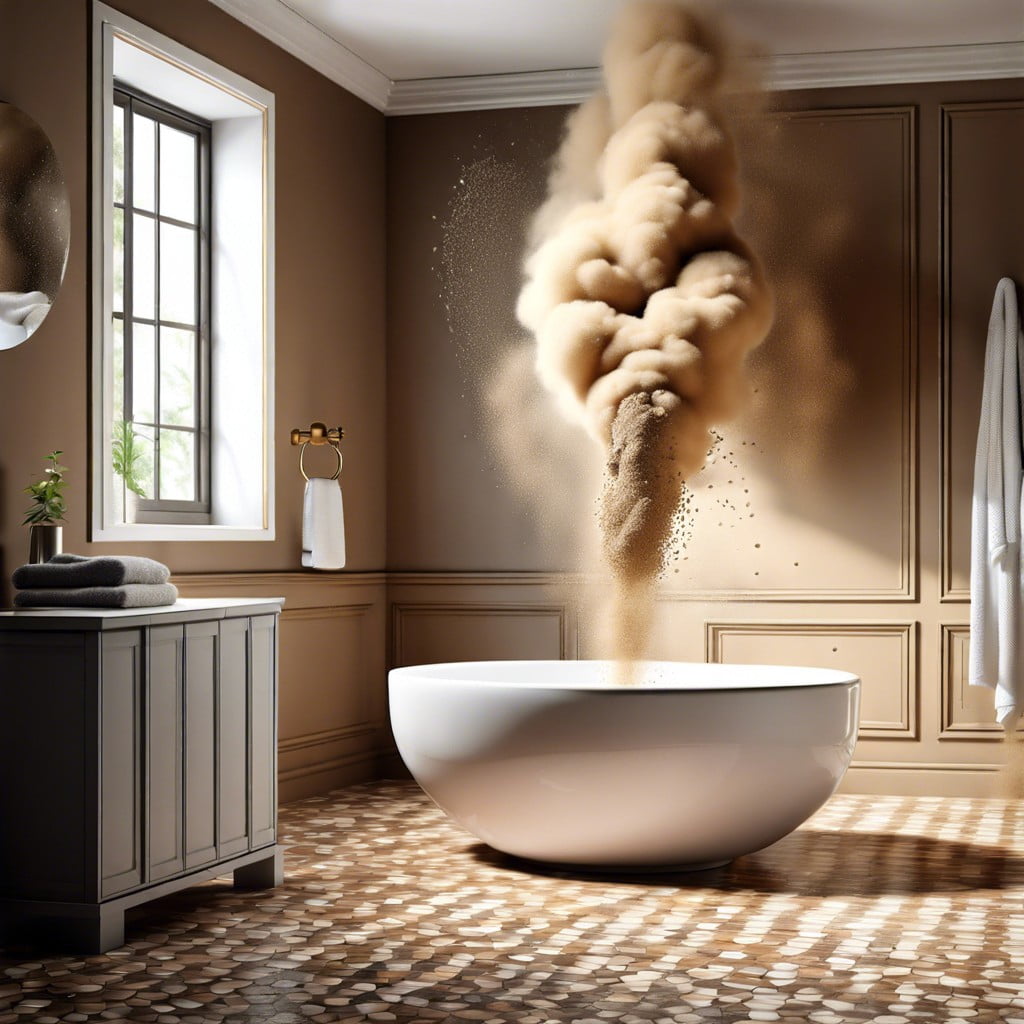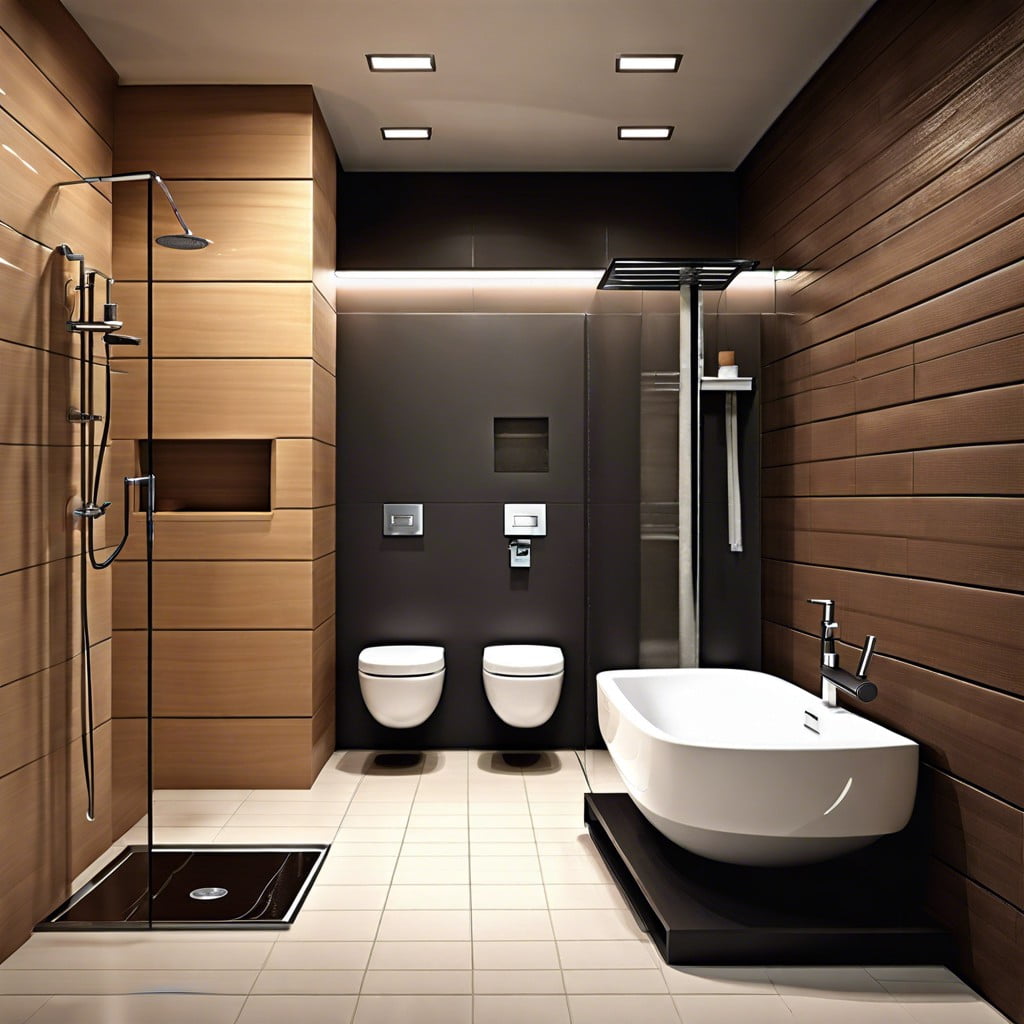Last updated on
In this comprehensive guide, we’ll unravel the mystery behind why your bathroom smells like body odor and provide practical solutions to address it.
Key takeaways:
- Drain clogs: Hair and soap create a pungent brew in pipes.
- P-Trap problems: Dry or grimy traps let fumes invade.
- Biofilm accumulation: Bacteria, oils, and products create a funk.
- Leaks: Moisture breeds mold and mildew, causing odors.
- Ventilation assessment: Proper airflow is crucial to prevent odors.
Identifying the Source of the Smell
Diving into the whiffy depths of a malodorous bathroom, it’s essential to pinpoint where that offensive scent is emanating from. Is it lurking near the shower drain or is the toilet the culprit? Perhaps it’s the sink, radiating a stench after every handwash. Locating the precise fixture responsible is your first step towards a fresher bathroom experience.
Consider the following:
- Drain Clogs: Bits of hair and soap can concoct a pungent brew in the pipes. A sense of smell can typically guide you to the affected drain.
- P-Trap Problems: That U-shaped pipe under the sink is supposed to hold water, creating a barrier against sewer gases. If it’s dry or grimy, the fumes are free to invade your space.
- Biofilm Accumulation: Ever notice a slimy coating in your shower? That’s biofilm, and it’s a mixture of bacteria, body oils, and shower products that can develop an unmistakable funk.
- Leaks: Hidden leaks within the walls or under the floor can cause moisture accumulation which, in turn, can be a breeding ground for mold and mildew—major contributors to unwelcome odors.
- Ventilation Assessment: Airflow is vital. A bathroom without proper ventilation can trap odors and increase humidity levels, making it a haven for smells to thrive.
- Sanitation Check: Regular cleaning curbs smells, so if a bathroom isn’t cleaned often, the accumulation of grime and waste can lead to persistent body odor-like smells.
- Sewer Line Inspection: Rare but more serious is a damaged sewer line. This issue can release a potent odor not just in the bathroom but potentially throughout the home.
A methodical approach to each of these points can help uncover the mystery and guide you to a successful olfactory overhaul.
Drain Clogs
A common nemesis in the war against odors, drain clogs trap hair, soap scum, and other debris over time. As these elements decompose, they emit a foul stench akin to body odor. Bacteria thrive in this environment, exacerbating the problem.
Here’s the game plan to tackle those unwelcome smells:
- Hot Water Flush: Weekly, pour boiling water down the drain to dissolve soap scum and oils that may be starting to form a clog.
- Baking Soda and Vinegar: For a more thorough cleaning, this dynamic duo can work wonders. The fizzing action helps break down the grime without harsh chemicals.
- Manual Removal: Sometimes it’s necessary to get your hands dirty. A drain snake or even tweezers can remove clumps of hair or buildup.
- Enzyme Cleaners: These eco-friendly solutions use natural bacteria to eat away at organic matter efficiently.
Tackling drain clogs promptly can not only banish current smells but also prevent future odor issues.
Dry or Dirty P-Trap
A P-trap is that curved section of piping beneath your sink, designed to keep a small amount of water at all times, which acts as a barrier against sewer gases entering your home.
When this trap dries out, say from lack of use or a leak, it can no longer guard against the foul odors. To resolve this, run your tap periodically to ensure water is present.
Additionally, evaporation isn’t the only enemy; grime and debris can also settle in the P-trap, creating a safe haven for bacteria—those little odor culprits.
A simple solution would be pouring a mixture of hot water and vinegar down the drain to clean it out. This can be a straightforward fix for those mysterious bad smells, reinstating your bathroom’s fresh environment.
Biofilm Buildup
Biofilm is a slimy substance formed by bacteria that adhere to surfaces in moist environments. In bathrooms, it often collects in drains, on shower curtains, and around sink areas. This slick layer can trap odors, resembling musty body odor, even after regular cleaning.
Combat biofilm by:
- Regularly pouring a mixture of hot water and vinegar down drains to break down the film.
- Scrubbing surfaces like shower doors and curtains with a mixture of baking soda and dish soap to cut through the grease.
- Using a stiff-bristled brush to clean around faucets and showerheads where biofilm can cling.
- Considering the use of enzymatic cleaners that are specifically designed to dissolve such organic matter without harming your plumbing.
By tackling biofilm, you hit the heart of the issue, eliminating that persistent body odor smell.
Leaky Pipes
When left unchecked, leaky pipes can act as a conduit for musty odors reminiscent of body odor. These leaks often happen at the joints and may go unnoticed behind walls or beneath floors. Here’s why they bring about that unwanted smell:
- Stagnant water: A slight, continuous leak can lead to pooling, creating an ideal setting for bacteria to thrive. That bacteria is often responsible for the unpleasant pong emanating from your bathroom.
- Mold growth: Leaks create moisture, which combines with warmth and darkness to offer a perfect breeding ground for mold, making your bathroom smell less like a spa and more like a locker room.
- Sewage leaks: If the leak is close to a sewage line, the problem escalates. Not only does the bathroom smell like a gym, but it might also carry hazardous bacteria.
It’s essential to locate these leaks promptly. Sometimes they manifest as a visible wet spot, a bulging wall or floor tile, or an unexpected increase in the water bill. Call a professional if you suspect hidden leaks; their expertise is invaluable in preserving the freshness and hygiene of your personal oasis.
Low Ventilation
Moisture and humidity are a bathroom’s worst foes. Without proper airflow, they linger, creating a perfect breeding ground for bacteria responsible for that unwelcome body odor-like scent. Over time, the steam from showers and baths needs to escape, but if your ventilation system isn’t up to the task, the dampness stagnates.
Consider the following points:
- Ventilation Fans: Essential in whisking away damp air, fans should be run during and for several minutes after a shower or bath.
- Windows: When possible, open them. Fresh air not only displaces the stale, it also disrupts the life cycle of odor-causing microbes.
- Door Gaps: Ensure there’s enough clearance under the bathroom door. This allows better air circulation throughout the home, facilitating the drying process.
- Regular Maintenance: Clean exhaust fans regularly to prevent dust build-up that can impede their efficiency.
Remember, investing in proper ventilation can transform your bathroom into a fresher, more inviting space.
Dirty Toilet and Bathroom
Neglecting regular cleaning rituals allows bacteria to thrive, especially in the warm, moist environment that toilets and bathrooms provide. These bacteria are often the culprits behind the lingering body odor scent.
Further compounding the problem, towels and bathmats can harbor sweat and skin cells, contributing to the off-putting aroma. Quick fixes include wiping down the toilet seat, bowl, and handle with disinfectant. Additionally, wash your towels and bathmats frequently to banish absorbed odors.
For a deeper clean, scrub the bathroom floor, tiles, and walls periodically, as they can also trap unpleasant scents. Use targeted cleaners for different areas to effectively eliminate odor-causing germs. Regular upkeep is more than a chore; it’s an odor prevention strategy.
Cracked or Broken Sewer Pipes
When sewer pipes beneath your bathroom develop cracks or breaks, they can become a secret passageway for unpleasant odors. Over time, shifting soil, corrosion, or even tree root intrusion can compromise pipe integrity. As these hidden channels falter, they may start to release sewer gases back into your home, mimicking the scent of body odor. These issues are more than just a nuisance; they pose health risks and can lead to significant property damage if left unaddressed.
Here’s what you need to know:
- Insidious and often invisible, sewer gas can permeate a space without overt signs of damage.
- A tell-tale sign is a persistent, pungent smell, especially after flushing toilets or running water down drains.
- DIY fixes are often inadequate—broken or cracked pipes usually require professional assessment and repair.
- Safety first: avoid prolonged exposure to sewer gases due to potential health hazards.
- Regular plumbing inspections can preempt the chaos, preserving the sanctity—and scent—of your bathroom retreat.
Remember, when it comes to plumbing, an ounce of prevention is worth a pound of cure. Keep an ear to the ground for unusual noises or changes in your bathroom’s baseline aroma, as these could indicate sewer pipe distress.
FAQ
Why does my bathroom smell of Bo?
The recurrent smell of BO in your bathroom may likely be due to the presence of mould and mildew, often caused by unattended water leakage or splash from shower or vanity, particularly around spots like the interior or underneath the vanity cabinet, and the wall that’s directly behind your toilet.
Why does my bathroom sink smell like body odor?
Often, a lingering body odor scent from your bathroom sink is due to bacterial buildup in the pipes caused by the accumulation of soapy water and dead skin cells.
Why does my bathroom smell sweaty?
Your bathroom may smell sweaty due to insufficient ventilation which prevents the room from drying out fully, potentially leading to issues like black mold.
How do I get rid of sweat smell in bathroom?
To eliminate sweat smell in your bathroom, place an open container filled with baking soda, which is a neutralizing element, to absorb and clear the undesired odor.
How could bathroom plumbing contribute to a body odor smell?
Bathroom plumbing can contribute to a body odor smell if there’s a sewage leak or if water traps have dried out, which allows odorous gases from the sewer line to seep into the home.
What are effective natural remedies to combat a body odor scent in the bathroom?
Natural remedies such as vinegar, baking soda, and essential oils can effectively combat a body odor scent in the bathroom.
Can certain materials used in bathroom fixtures and tiles harbor sweat and exacerbate the smell?
Indeed, certain materials like porous tiles and non-resistant fixtures can harbor sweat and intensify the smell in bathrooms.
Recap




